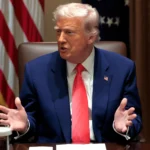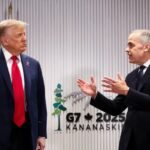Energy News Beat
Beijing is seeking new deals elsewhere to weather the storm, but some countries are opting out for fear of angering the White House.
U.S. President Donald Trump’s latest trade moves are still top of mind for most foreign powers, global markets, and American consumers. While much of the world is breathing a sigh of relief over Trump’s decision on Wednesday to impose a 90-day pause on new, higher reciprocal tariffs targeting nearly 100 partners, one country is still in the doghouse. And U.S. investors are concerned.
The White House issued a statement on Thursday confirming that the three-month suspension will not affect China. Instead, Trump raised the minimum tariff rate on Beijing to 145 percent, effective immediately; this includes the 125 percent duty that Trump announced Wednesday as well the 20 percent levy that he issued near the start of his second term.
U.S. President Donald Trump’s latest trade moves are still top of mind for most foreign powers, global markets, and American consumers. While much of the world is breathing a sigh of relief over Trump’s decision on Wednesday to impose a 90-day pause on new, higher reciprocal tariffs targeting nearly 100 partners, one country is still in the doghouse. And U.S. investors are concerned.
The White House issued a statement on Thursday confirming that the three-month suspension will not affect China. Instead, Trump raised the minimum tariff rate on Beijing to 145 percent, effective immediately; this includes the 125 percent duty that Trump announced Wednesday as well the 20 percent levy that he issued near the start of his second term.
China has responded with its own set of retaliatory measures, including raising tariffs to 84 percent effective Thursday. And Beijing is reportedly also turning to other countries to help weather the storm, notably including those in the European Union.
“China is willing to work with the EU to jointly implement the important consensus reached by the leaders of China and the EU, strengthen communication and exchanges, and deepen China-EU trade, investment and industrial cooperation,” China’s Xinhua News Agency wrote on Thursday around several calls between high-level Chinese and European officials.
Not all countries are interested in boosting trade with Beijing, though. Australia and India have reportedly turned down Chinese calls for greater cooperation, and many South Asian nations have chosen the silent treatment for fear of potentially angering the White House. “Unlike China and some other global powers, most South Asian countries are too economically fragile to take retaliatory measures and risk an all-out trade war with the United States,” FP’s Michael Kugelman wrote in this week’s South Asia Brief.
Read more in today’s World Brief: U.S.-China Trade War Intensifies.
This post is part of FP’s ongoing coverage of the Trump administration. Follow along here.
Alexandra Sharp is the World Brief writer at Foreign Policy. X: @AlexandraSSharp
The post U.S.-China Trade War Worries Markets, Sparks Tariff Negotiations appeared first on Energy News Beat.









